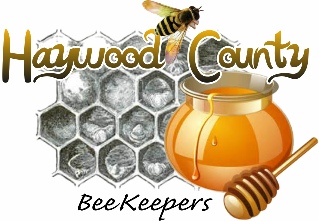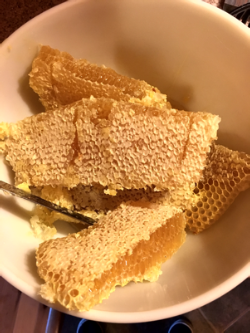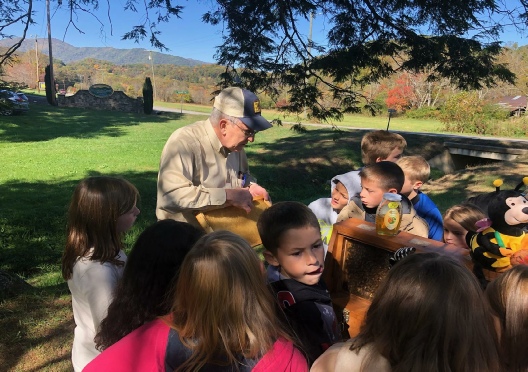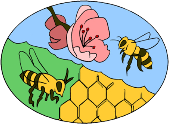
We would like to welcome all beekeepers to visit the Haywood County Beekeepers Chapter (HCBC) of the North Carolina State Beekeepers Association and it is our hope that the information contained in this website will enlighten and inspire about honeybees. Our goal is to offer information and encouragement to beekeepers of all levels as together we learn and grow in our desire to care for bees as we help our local community to understand more about these busy pollinators of the environment.
Haywood County Beekeepers Chapter (HCBC)
Since 2012, HCBC has grown to over a hundred honeybee enthusiasts; mostly as hobbyists who manage only a few hives. However, the club does have members who are certified, journeyman, or master beekeepers with varying ranges of expertise, some of these members have over forty-years of beekeeping experience. During any typical HCBC meeting, you will find beekeepers who share a common interest in learning more about bees and their habitat, while sharing knowledge with others in the club.

General Information
Monthly Meetings
First Tuesday at 7:00 PM
Haywood County
Cooperative Extension
589 Raccoon Road
Waynesville, NC 28786
Mailing Address:
Haywood County
Beekeepers Chapter
P.O. Box 1391
Clyde, NC 28721
As beekeepers, we understand the impact that bees have on the environment and on our society, because honeybees pollinate crops that are responsible for one out of every three bites of food that people consume. From a national perspective, this represents a fruit, vegetable, and crop industry totaling more than $14 billion dollars that allows local communities to grow food. Additionally, honeybees pollinate many plants in the natural landscape, And, there is always lots of honey to go around. Below are a few of the annual activities and services that the Haywood County Beekeepers Chapter provides to its members and the community:
- In cooperation with the Haywood County Extension Center, the club hosts two bee schools every year; a Beginning Beekeeping School and an Advanced Beekeeping School, usually beginning in January or February. These courses can teach you everything you need to know to get started as a beekeeper.
- Every April, at the request of area beekeepers, a bee inspector will visit your bee apiary to address any concerns you may have. These inspections are arranged in cooperation with the Haywood County Cooperative Extension service and the North Carolina Department of Agriculture.
- The club participates in many of the local seasonal festivals where volunteers share their knowledge of the honey bee with the use of an observation hive and educational materials.
- On school days, you can find our willing beekeeper volunteers at some of the local fairs displaying educational bee materials and answering questions by interested visitors.
- An experienced club member will gladly assist you in removing a swarm of unwelcome bees from your property, contact one of our swarm removal members.


 Find a Mentor
Find a MentorOne of our favorite club activities is recruiting new beekeepers. You can join the hive by completing an HCBC membership form and mail it to Haywood County Bee Club, PO Box 1391, Clyde, NC 28721, along with a check for the amount indicated on the application. Better yet, print out the membership form and bring it to one of our monthly meetings!
Meetings are held on the first Tuesday of each month from 7:00 p.m. to 8:30 p.m., at the Haywood County Extension Center. Guests are always welcome to come and enjoy the buzzing activity, because we care about sharing beekeeping knowledge with each other, and our community.
If you need a new colony of friends and beekeepers, then HCBC invites you to join this colony. We are always ready to expand, so we can pollinate the community with the sweet aroma of beekeeping.


David Zachary educating some 3rd graders about honeybees.
HCBC needs more “worker bees” to join the colony.
Consider becoming a member.
Chunk honey… tantalizing to the taste buds… sweet to the stomach… and nothing but Pure Raw mouth watering pleasure!


July 19, 2025
Time: 2 - 4 P.M. - Field Day, Queens Apiary located at 96 Henson Cove Rd Canton, NC.
Tina Wegmann, Vice-President
Haywood County Chapter Bee Club

 Membership Form
Membership Form




 Find a Mentor
Honeybee Swarm Removal
Find a Mentor
Honeybee Swarm Removal





